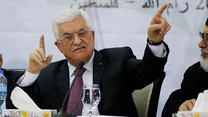15 mar 2015
|
|
The UN is looking into possible war-crimes committed by Israel in Gaza. RT's Bel Trew has the stories of those who survivor the offensive.
|
11 mar 2015
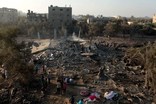
The Palestinian Human Rights Organizations Council (PHROC) voiced concern over a request filed to the UN Security Council (UNSC) by the UN Independent Commission of Inquiry on the 2014 Gaza offensive seeking delay of the report on war crimes to June.
The PHROC expressed hope that the UN investigation committee would make use of the allotted time to pop in the Occupied Palestinian territories, particularly Gaza, so as to have a close look into the disastrous upshots of last summer’s Israeli offensive on the blockaded coastal enclave and finalize the report at the soonest time possible.
The PHORC urged the probe committee to deliver a succinct oral or written presentation on the progress of its allotted mission during the UNSC session, set to kick off sometime this month.
The council reiterated concerns over potential appeals for renewed delays, which will have serious repercussion on the casualties.
Any delays in prosecuting war criminals would lead to “hazardous upshots on the human rights situation in the occupied Palestinian territories,” the statement added.
A UN report on war crimes committed during Israel’s military aggression on Gaza was due to be tabled with the U.N. Human Rights Council on March 23.
The commission of inquiry's former chairman, William Schabas, stepped down last month due to Israeli pressure and allegations of bias. Israel wants the report to be shelved.
Over 2,200 Palestinians were killed and some 10,000 were left wounded during the latest offensive on Gaza.
The PHROC expressed hope that the UN investigation committee would make use of the allotted time to pop in the Occupied Palestinian territories, particularly Gaza, so as to have a close look into the disastrous upshots of last summer’s Israeli offensive on the blockaded coastal enclave and finalize the report at the soonest time possible.
The PHORC urged the probe committee to deliver a succinct oral or written presentation on the progress of its allotted mission during the UNSC session, set to kick off sometime this month.
The council reiterated concerns over potential appeals for renewed delays, which will have serious repercussion on the casualties.
Any delays in prosecuting war criminals would lead to “hazardous upshots on the human rights situation in the occupied Palestinian territories,” the statement added.
A UN report on war crimes committed during Israel’s military aggression on Gaza was due to be tabled with the U.N. Human Rights Council on March 23.
The commission of inquiry's former chairman, William Schabas, stepped down last month due to Israeli pressure and allegations of bias. Israel wants the report to be shelved.
Over 2,200 Palestinians were killed and some 10,000 were left wounded during the latest offensive on Gaza.
9 mar 2015

UN Human Rights Council hopes to postpone publication of report in war crimes committed during Israel and Hamas summer conflict.
UN investigators looking at possible war crimes committed by all sides during the Gaza war last year have asked to postpone publication of their report from March until June to consider further evidence received, a UN statement said on Monday.
Their report on violations by Israeli armed forces and Hamas militants in Gaza during the July-August conflict was due to be issued to the UN Human Rights Council in Geneva on March 23.
In a statement, Council President Joachim Ruecker said that he backed the request for a deferral to June 2015 to finalize a comprehensive report by the team of investigators. The 47-nation Council is expected to approve the postponement before its ongoing main annual session ends on March 27.
The commission of inquiry's former chairman, William Schabas, stepped down last month after Israeli allegations of bias due to consultancy work he did for the Palestine Liberation Organization. Israel wants the report shelved.
Mary McGowan Davis, who succeeded Schabas as chair, said in a letter to Council president Ruecker, also made public on Monday: "In this context, the Commission must analyze with the utmost objectivity the large number of additional submissions and documents received over the past few weeks from both sides, relating to the fact-finding dimension of our mandate."
Some 2,256 Palestinians were killed during the latest Gaza conflict, of whom 1,563 were civilians including 538 children, while 66 Israeli soldiers and five civilians died, UN special rapporteur Makarim Wibisono said in a separate report last week. He called on Israel to investigate killings of civilians.
UN investigators looking at possible war crimes committed by all sides during the Gaza war last year have asked to postpone publication of their report from March until June to consider further evidence received, a UN statement said on Monday.
Their report on violations by Israeli armed forces and Hamas militants in Gaza during the July-August conflict was due to be issued to the UN Human Rights Council in Geneva on March 23.
In a statement, Council President Joachim Ruecker said that he backed the request for a deferral to June 2015 to finalize a comprehensive report by the team of investigators. The 47-nation Council is expected to approve the postponement before its ongoing main annual session ends on March 27.
The commission of inquiry's former chairman, William Schabas, stepped down last month after Israeli allegations of bias due to consultancy work he did for the Palestine Liberation Organization. Israel wants the report shelved.
Mary McGowan Davis, who succeeded Schabas as chair, said in a letter to Council president Ruecker, also made public on Monday: "In this context, the Commission must analyze with the utmost objectivity the large number of additional submissions and documents received over the past few weeks from both sides, relating to the fact-finding dimension of our mandate."
Some 2,256 Palestinians were killed during the latest Gaza conflict, of whom 1,563 were civilians including 538 children, while 66 Israeli soldiers and five civilians died, UN special rapporteur Makarim Wibisono said in a separate report last week. He called on Israel to investigate killings of civilians.
4 mar 2015
"How are they allowed to take away our money? Are we dealing with a state or with a gangster?" he asked a gathering of the Palestine Liberation Organization's central council, its second-highest decision-making body.
The council discussed the security coordination with Israeli authorities and potential diplomatic steps, including the ongoing efforts at the International Criminal Court in The Hague. The Central Council, led by Salim Zanoun, has 124 members from the West Bank, Gaza, and abroad. At the opening of the conference, Palestinian President Mahmoud Abbas comprehensively addressed recent developments in the conflict.
The committee met after weeks of intense American pressure on Abbas – in part to assure the Palestinian Authority does not take any hasty measures which could affect the election in Israel. Consequently, Abbas refrained from addressing the security cooperation with Israel during his speech.
Abbas said the Palestinians received an offer for Israel to release the PA's frozen tax funds if they backed out of their efforts at the ICC in The Hague, but that the offer was rebuffed. "The international court in The Hague is the only place in which we can raise our complaints over the occupation. They told us that if we do not go to The Hague they will return our money. We refuse to trade our bid at The Hague for tax money," he said. The Palestinian president claimed Israel was withholding 1.8 billion shekels.
Abbas said the Palestinians would resume the negotiations with Israel if construction in the settlements is frozen and security detainees are released. He claimed Israel has not honored its commitments with the Palestinians. "We must examine how to maintain the PA and whether all parties commit to the agreements and not only one side."
The PA president stressed the Palestinians would not surrender but would not resort to violence either. "A peaceful, popular resistance is our way." Abbas claimed Israel paused all progress because of the "excuse" that election was near. "We do not intervene in the Israeli elections and we are willing to negotiate with any person who the people of Israel elect. We do not care who wins." However, he praised the alliance between the Arab lists and wished them success on March 17.
He then reiterated that the Palestinians were committed to the peace process and vehemently opposed terrorism.
"The recognition by parliaments in European countries does not mean we no longer wish to negotiate or are avoiding talks," he said, and called on countries across the world to continue recognizing Palestinian sovereignty. Abbas briefly addressed the Islamic State terror group, condemning the murderous acts of the jihadi collective, including the burning alive of the Jordanian pilot and the killing of 21 Egyptians in Libya.
The council discussed the security coordination with Israeli authorities and potential diplomatic steps, including the ongoing efforts at the International Criminal Court in The Hague. The Central Council, led by Salim Zanoun, has 124 members from the West Bank, Gaza, and abroad. At the opening of the conference, Palestinian President Mahmoud Abbas comprehensively addressed recent developments in the conflict.
The committee met after weeks of intense American pressure on Abbas – in part to assure the Palestinian Authority does not take any hasty measures which could affect the election in Israel. Consequently, Abbas refrained from addressing the security cooperation with Israel during his speech.
Abbas said the Palestinians received an offer for Israel to release the PA's frozen tax funds if they backed out of their efforts at the ICC in The Hague, but that the offer was rebuffed. "The international court in The Hague is the only place in which we can raise our complaints over the occupation. They told us that if we do not go to The Hague they will return our money. We refuse to trade our bid at The Hague for tax money," he said. The Palestinian president claimed Israel was withholding 1.8 billion shekels.
Abbas said the Palestinians would resume the negotiations with Israel if construction in the settlements is frozen and security detainees are released. He claimed Israel has not honored its commitments with the Palestinians. "We must examine how to maintain the PA and whether all parties commit to the agreements and not only one side."
The PA president stressed the Palestinians would not surrender but would not resort to violence either. "A peaceful, popular resistance is our way." Abbas claimed Israel paused all progress because of the "excuse" that election was near. "We do not intervene in the Israeli elections and we are willing to negotiate with any person who the people of Israel elect. We do not care who wins." However, he praised the alliance between the Arab lists and wished them success on March 17.
He then reiterated that the Palestinians were committed to the peace process and vehemently opposed terrorism.
"The recognition by parliaments in European countries does not mean we no longer wish to negotiate or are avoiding talks," he said, and called on countries across the world to continue recognizing Palestinian sovereignty. Abbas briefly addressed the Islamic State terror group, condemning the murderous acts of the jihadi collective, including the burning alive of the Jordanian pilot and the killing of 21 Egyptians in Libya.
|
|
A UN envoy is calling on Israel to investigate the deaths of more than 15-hundred Palestinian civilians during its recent war on the Gaza Strip.
Makarim Wibisono says the disproportionate cost of Palestinian lives raises questions as to whether Tel Aviv adhered to international law during the war. The U-N special rapporteur on human rights added that most of the Palestinian victims were families killed in missile strikes on their homes, usually at night. Many of the victims were women and children. Palestinians are now pushing to join the International Criminal Court to bring charges against Israel for war crimes it commited during the 50-day offensive last summer. |
3 mar 2015
|
|
Palestinians plan to lodge their first complaint against Israel at the International Criminal Court over its war crimes.
Senior Palestinian official Mohammed Shtayyeh says the complaint will be filed at the ICC on April the first. It will contain Israeli crimes against Palestinians during its summer war on Gaza as well as its settlement activities in the occupied territories. The Palestinian unity government formally joined the I-C-C in January, and set up a committee tasked with overseeing the complaints against Israel. Tel Aviv opposed the Palestinians' membership at the I-C-C. It's also said that it would not allow its soldiers to stand trial at the court over the charges. |
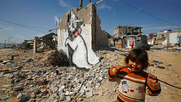
Makarim Wibisono, UN special rapporteur on human rights in the Palestinian territories, said Tuesday that Israel must investigate the killing of more than 1,500 civlians during summer war and make findings public.
A United Nations envoy called on Israel on Tuesday to investigate the killing of more than 1,500 Palestinian civilians, one third of them children, during the 2014 Gaza war, and to make the findings public.
Makarim Wibisono, a former Indonesian ambassador, issued his first report to the UN Human Rights Council since becoming its special rapporteur on human rights in the Palestinian territories last June.
US Secretary of State John Kerry accused the forum on Monday of being obsessed by allegations of Israeli abuses and said the United States would defend Israel against efforts to isolate it. Some 2,256 Palestinians were killed during the July-August conflict, of whom 1,563 were civilians including 538 children, while 66 Israeli soldiers and five civilians died, Wibisono said. Israel says it launched the offensive after rocket attacks by militants operating out of the Islamist Hamas-ruled strip.
"The stark disparity in casualty figures on the two sides ... reflects the (skewed) balance of power and the disproportionate cost borne by Palestinian civilians, raising questions as to whether Israel adhered to the international law principles of distinction, proportionality and precautions," Wibisono said. Most civilian victims were "not simply bystanders on the street in the wrong place at the wrong time", he said. "Most victims were families killed in missile strikes on their own homes, usually at night." He interviewed victims in Amman and Cairo or witnesses on video calls in Gaza, as Israel had not let him go there.
A separate report on possible war crimes committed by both sides is to be issued by a UN commission of inquiry soon. Its chairman was forced to step down last month.
Unexploded ordnance still litters Gaza, causing further casualties, he said, with an estimated 7,000 devices needing to be defused. Some 100,000 people remain displaced while 450,000 are disconnected from water mains.
A United Nations envoy called on Israel on Tuesday to investigate the killing of more than 1,500 Palestinian civilians, one third of them children, during the 2014 Gaza war, and to make the findings public.
Makarim Wibisono, a former Indonesian ambassador, issued his first report to the UN Human Rights Council since becoming its special rapporteur on human rights in the Palestinian territories last June.
US Secretary of State John Kerry accused the forum on Monday of being obsessed by allegations of Israeli abuses and said the United States would defend Israel against efforts to isolate it. Some 2,256 Palestinians were killed during the July-August conflict, of whom 1,563 were civilians including 538 children, while 66 Israeli soldiers and five civilians died, Wibisono said. Israel says it launched the offensive after rocket attacks by militants operating out of the Islamist Hamas-ruled strip.
"The stark disparity in casualty figures on the two sides ... reflects the (skewed) balance of power and the disproportionate cost borne by Palestinian civilians, raising questions as to whether Israel adhered to the international law principles of distinction, proportionality and precautions," Wibisono said. Most civilian victims were "not simply bystanders on the street in the wrong place at the wrong time", he said. "Most victims were families killed in missile strikes on their own homes, usually at night." He interviewed victims in Amman and Cairo or witnesses on video calls in Gaza, as Israel had not let him go there.
A separate report on possible war crimes committed by both sides is to be issued by a UN commission of inquiry soon. Its chairman was forced to step down last month.
Unexploded ordnance still litters Gaza, causing further casualties, he said, with an estimated 7,000 devices needing to be defused. Some 100,000 people remain displaced while 450,000 are disconnected from water mains.
2 mar 2015
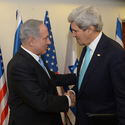
Secretary of State warns council over 'deeply concerning record on Israel', says it risks undermining its own credibility.
US Secretary of State John Kerry on Monday delivered a vigorous defense of Israel before the United Nations Human Rights Council, urging its members to end what he branded an "unbalanced focus" on Israel that could undermine its credibility.
His remarks came as the Obama administration attempts to blunt complaints that it has not been strong enough in its support for Israel, criticism now centered on its pursuit of a nuclear deal with Iran.
Even as a bitter US-Israel dispute over a possible Iran deal was expected to heat up in Washington later Monday, Kerry affirmed America's steadfast commitment to its top Mideast ally and called on the council to take a more balanced approach toward Israel.
In a speech denouncing rights abuses in places like Syria, North Korea and Ukraine, Kerry spent several minutes on what he called the council's "deeply concerning record on Israel."
"No one in this room can deny that there is an unbalanced focus on one democratic country," he said, decrying the fact that no country other than Israel has a permanent agenda item on the council's schedule. "It must be said the (council's) obsession with Israel actually risks undermining the credibility of the entire organization."
The council frequently targets Israel for criticism in resolutions and investigations, notably over military action it has taken against Palestinian militants in Gaza. A new report commissioned by the council about last year's Gaza war is expected to be released later this month.
Kerry and other US officials have said the Obama administration's commitment to Israel's defense is unbreakable. On Sunday, and again at the council on Monday, Kerry noted the administration has intervened to protect Israel from condemnation at the United Nations and other international forums several hundred times in the last two years.
"We will oppose any effort by any group or participant in the UN system to arbitrarily and regularly delegitimize or isolate Israel," he said. "When it comes to human rights no country on earth should be free from scrutiny but neither should any country be subject to unfair or unfounded bias."
Kerry noted in particular that the human rights council would this year consider a resolution sponsored by Syria denouncing Israel's conduct in the Golan Heights. Kerry said it made no sense to consider this when thousands of Syrians are fleeing to the Golan and many are getting medical treatment there from Israeli physicians.
Kerry's speech to the council was the first of several addresses on Monday that focus on the U.S.-Israel relationship. Later Monday in Washington, the US Ambassador to the United Nations, Samantha Power, and President Barack Obama's national security adviser, Susan Rice, as well as Prime Minister Benjamin Netanyahu, are to speak to America's leading pro-Israel lobby. Netanyahu on Tuesday is to deliver a speech to a joint session of Congress, warning about the threat posed by Iran and arguing against a nuclear agreement that may result from the current negotiations.
The row over Netanyahu's speech to Congress has been waging since it was announced last month and is likely to continue after it has been delivered. Netanyahu arrived in the US on Sunday night, ahead of Tuesday's address, which is being skipped by dozens of Democratic lawmakers, among them Vice President Joe Biden.
Shortly after his speech in Geneva, Kerry was to resume nuclear negotiations with Iranian Foreign Minister Mohammad Javad Zarif in the Swiss city of Montreux.
Those talks are expected to last through at least midday Wednesday, after which Kerry will travel to Saudi Arabia to discuss the talks with the country's new king and then to London where he will brief foreign ministers of the other Gulf Arab states. Both Israel and the Sunni Gulf Arabs have grave concerns about Shiite Iran's nuclear program.
US Secretary of State John Kerry on Monday delivered a vigorous defense of Israel before the United Nations Human Rights Council, urging its members to end what he branded an "unbalanced focus" on Israel that could undermine its credibility.
His remarks came as the Obama administration attempts to blunt complaints that it has not been strong enough in its support for Israel, criticism now centered on its pursuit of a nuclear deal with Iran.
Even as a bitter US-Israel dispute over a possible Iran deal was expected to heat up in Washington later Monday, Kerry affirmed America's steadfast commitment to its top Mideast ally and called on the council to take a more balanced approach toward Israel.
In a speech denouncing rights abuses in places like Syria, North Korea and Ukraine, Kerry spent several minutes on what he called the council's "deeply concerning record on Israel."
"No one in this room can deny that there is an unbalanced focus on one democratic country," he said, decrying the fact that no country other than Israel has a permanent agenda item on the council's schedule. "It must be said the (council's) obsession with Israel actually risks undermining the credibility of the entire organization."
The council frequently targets Israel for criticism in resolutions and investigations, notably over military action it has taken against Palestinian militants in Gaza. A new report commissioned by the council about last year's Gaza war is expected to be released later this month.
Kerry and other US officials have said the Obama administration's commitment to Israel's defense is unbreakable. On Sunday, and again at the council on Monday, Kerry noted the administration has intervened to protect Israel from condemnation at the United Nations and other international forums several hundred times in the last two years.
"We will oppose any effort by any group or participant in the UN system to arbitrarily and regularly delegitimize or isolate Israel," he said. "When it comes to human rights no country on earth should be free from scrutiny but neither should any country be subject to unfair or unfounded bias."
Kerry noted in particular that the human rights council would this year consider a resolution sponsored by Syria denouncing Israel's conduct in the Golan Heights. Kerry said it made no sense to consider this when thousands of Syrians are fleeing to the Golan and many are getting medical treatment there from Israeli physicians.
Kerry's speech to the council was the first of several addresses on Monday that focus on the U.S.-Israel relationship. Later Monday in Washington, the US Ambassador to the United Nations, Samantha Power, and President Barack Obama's national security adviser, Susan Rice, as well as Prime Minister Benjamin Netanyahu, are to speak to America's leading pro-Israel lobby. Netanyahu on Tuesday is to deliver a speech to a joint session of Congress, warning about the threat posed by Iran and arguing against a nuclear agreement that may result from the current negotiations.
The row over Netanyahu's speech to Congress has been waging since it was announced last month and is likely to continue after it has been delivered. Netanyahu arrived in the US on Sunday night, ahead of Tuesday's address, which is being skipped by dozens of Democratic lawmakers, among them Vice President Joe Biden.
Shortly after his speech in Geneva, Kerry was to resume nuclear negotiations with Iranian Foreign Minister Mohammad Javad Zarif in the Swiss city of Montreux.
Those talks are expected to last through at least midday Wednesday, after which Kerry will travel to Saudi Arabia to discuss the talks with the country's new king and then to London where he will brief foreign ministers of the other Gulf Arab states. Both Israel and the Sunni Gulf Arabs have grave concerns about Shiite Iran's nuclear program.
19 feb 2015
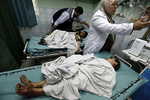
Children in Gaza wounded by IDF attacks
IDF advocate general Maj. Gen. Danny Efroni says possible investigation by the International Criminal Court into Gaza war to be dealt with through 'full and thorough' Israeli investigations.
The IDF's chief legal adviser said on Thursday that he is not concerned about a possible investigation by the International Criminal Court into Israel's conduct during last year's Gaza war. Israel's own internal probes are sufficient, said advocate general Maj. Gen. Danny Efroni.
The Palestinians recently joined the Netherlands-based court and have threatened to press war crimes charges against Israel there. But, according to the court's founding statute, any robust internal investigation could prevent an outside one by the court.
"I am not concerned because I think I am doing my job," Efroni told journalists on the sidelines of a conference about the laws of armed conflict. He said the quality and professionalism of the investigations being carried out were "sufficient enough" to stave off a probe by the international court. Efroni has opened 15 criminal investigations into separate incidents from the 50-day war that killed more than 2,100 Palestinians, many of them civilians, and 72 Israelis, mostly soldiers. Two probes have been closed because Palestinians who had lodged complaints did not want to testify. The military declined to say which cases were closed.
Israel launched the operation in Gaza last summer in what it said was a mission to halt relentless rocket fire by Hamas militants. Israel has defended the operation as an act of self-defense and blamed Hamas for the heavy civilian death toll, saying the militant group used residential areas for cover. But critics have pointed to the heavy Palestinian civilian death toll and questioned whether Israel's response was proportionate. The international court could also investigate Hamas' conduct during the war.
Israel has also come under fire from critics who say it fails to thoroughly investigate its military operations or prosecute soldiers for abuses. Israel says it does investigate its actions, although those inquiries rarely lead to criminal punishment. Following a similar operation in Gaza in early 2009, the army convicted four soldiers on various charges, including looting, improper use of a weapon and life-endangering conduct. The most serious sentence was a three-and-a-half month prison term. Efroni called the Israeli investigations "full and thorough."
IDF advocate general Maj. Gen. Danny Efroni says possible investigation by the International Criminal Court into Gaza war to be dealt with through 'full and thorough' Israeli investigations.
The IDF's chief legal adviser said on Thursday that he is not concerned about a possible investigation by the International Criminal Court into Israel's conduct during last year's Gaza war. Israel's own internal probes are sufficient, said advocate general Maj. Gen. Danny Efroni.
The Palestinians recently joined the Netherlands-based court and have threatened to press war crimes charges against Israel there. But, according to the court's founding statute, any robust internal investigation could prevent an outside one by the court.
"I am not concerned because I think I am doing my job," Efroni told journalists on the sidelines of a conference about the laws of armed conflict. He said the quality and professionalism of the investigations being carried out were "sufficient enough" to stave off a probe by the international court. Efroni has opened 15 criminal investigations into separate incidents from the 50-day war that killed more than 2,100 Palestinians, many of them civilians, and 72 Israelis, mostly soldiers. Two probes have been closed because Palestinians who had lodged complaints did not want to testify. The military declined to say which cases were closed.
Israel launched the operation in Gaza last summer in what it said was a mission to halt relentless rocket fire by Hamas militants. Israel has defended the operation as an act of self-defense and blamed Hamas for the heavy civilian death toll, saying the militant group used residential areas for cover. But critics have pointed to the heavy Palestinian civilian death toll and questioned whether Israel's response was proportionate. The international court could also investigate Hamas' conduct during the war.
Israel has also come under fire from critics who say it fails to thoroughly investigate its military operations or prosecute soldiers for abuses. Israel says it does investigate its actions, although those inquiries rarely lead to criminal punishment. Following a similar operation in Gaza in early 2009, the army convicted four soldiers on various charges, including looting, improper use of a weapon and life-endangering conduct. The most serious sentence was a three-and-a-half month prison term. Efroni called the Israeli investigations "full and thorough."
16 feb 2015

Irish Foreign Minister Charles Flanagan on Monday arrived in the Gaza Strip for a brief visit.
Palestinian official sources said Flanagan, accompanied by a delegation of 14 officials, arrived in Gaza through the Erez crossing between Israel and Gaza Strip in order to hold talks and survey some projects supervised by Ireland.
The visit by Ireland's top diplomat comes one day after Middle East Quartet envoy Tony Blair visited the Gaza Strip.
Over the past couple of months, foreign ambassadors, diplomats and officials have been visiting the besieged Gaza Strip.
Palestinian official sources said Flanagan, accompanied by a delegation of 14 officials, arrived in Gaza through the Erez crossing between Israel and Gaza Strip in order to hold talks and survey some projects supervised by Ireland.
The visit by Ireland's top diplomat comes one day after Middle East Quartet envoy Tony Blair visited the Gaza Strip.
Over the past couple of months, foreign ambassadors, diplomats and officials have been visiting the besieged Gaza Strip.
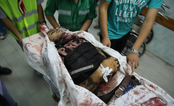
The Palestinian ministry of information strongly denounced Israel's channel 7 for fabricating claims about some of the journalists that had been killed by the Israeli army during the last war on the Gaza Strip, and described its report as "misleading."
Israel's channel 7 claimed in a recent report that eight of the journalists who were killed during Israel's last military operation in Gaza were working for Hamas and Islamic Jihad.
The information ministry said in a press release on Sunday that the channel's claims about the journalists was an exposed attempt by the Israeli government to shirk its responsibility for the crimes its army had committed against the journalists in Gaza.
The ministry underlined that all Israeli crimes against the journalists in the last war were documented in reports issued by international and local organizations, especially the International Federation of Journalists.
It said that Israel's attempt to deflect attention from its crimes by questioning the number of slain journalists and their professional activities could not deceive the UN probe committee or the international community.
Israel's channel 7 claimed in a recent report that eight of the journalists who were killed during Israel's last military operation in Gaza were working for Hamas and Islamic Jihad.
The information ministry said in a press release on Sunday that the channel's claims about the journalists was an exposed attempt by the Israeli government to shirk its responsibility for the crimes its army had committed against the journalists in Gaza.
The ministry underlined that all Israeli crimes against the journalists in the last war were documented in reports issued by international and local organizations, especially the International Federation of Journalists.
It said that Israel's attempt to deflect attention from its crimes by questioning the number of slain journalists and their professional activities could not deceive the UN probe committee or the international community.
15 feb 2015

In an investigation conducted by Associated Press, it was revealed that 89% of victims killed in the Israeli offensive conducted in Gaza, this past summer, were civilians.
Al Ray Palestinian Media Agency reports that, according to the investigation, 60% of 844 people killed were children, women and elderly, while only 11% of them were militants.
The investigation reviewed 247 raids out of more than 5,000 raids launched on Gaza, according to witnesses testimonies and field visits to bombed buildings.
The youngest victim was only 4 days old, and the oldest was 95 years. 280 victims were under 16, including 19 infants. 108 children were under 5 years of age.
The investigation also pointed out that 83 raids killed 3 or more members of one family, while only 96 people were armed, 11% of the total number of victims. The other 240 victims were unarmed men aged between 16-59.
Al Ray notes that the investigation did not include the victims who were killed by the artillery shelling, sniping or field operations, as was the case in the eastern areas of Gaza during the ground incursion.
Al Ray Palestinian Media Agency reports that, according to the investigation, 60% of 844 people killed were children, women and elderly, while only 11% of them were militants.
The investigation reviewed 247 raids out of more than 5,000 raids launched on Gaza, according to witnesses testimonies and field visits to bombed buildings.
The youngest victim was only 4 days old, and the oldest was 95 years. 280 victims were under 16, including 19 infants. 108 children were under 5 years of age.
The investigation also pointed out that 83 raids killed 3 or more members of one family, while only 96 people were armed, 11% of the total number of victims. The other 240 victims were unarmed men aged between 16-59.
Al Ray notes that the investigation did not include the victims who were killed by the artillery shelling, sniping or field operations, as was the case in the eastern areas of Gaza during the ground incursion.
